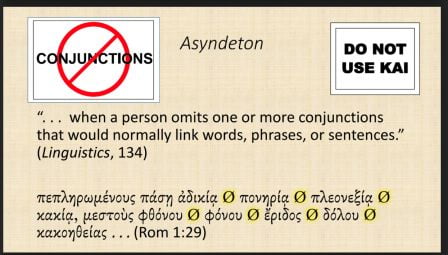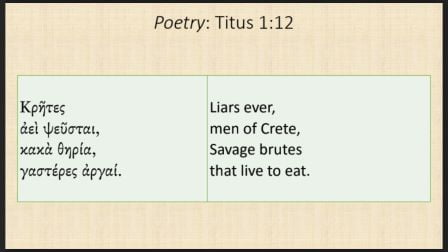Monday, February 22, 2021
7:20 AM Asyndeton. Gives me a Charlie Horse between the ears every time.
When an author fails to use a conjunction, how are we to understand his or her logic? Does the sentence in question go with what comes before it? After it? Or is it meant to be a stand-alone concept?
I was pondering this roadside hazard while reading Philippians last night. Here is Phil. 4:4-7. Paul’s injunctions stab the ears:
- Always be full of joy in the Lord!
- Again I will say it, Rejoice!
- Let everyone see how bighearted you are!
- The Lord is near!
- Don’t worry about anything!
- Instead, pray about everything! Tell God what you need and don’t forget to thank him for his answers!
- Then you will experience God’s peace, which is far more wonderful than the human mind can understand. His peace will set a guard over your thoughts and hearts as you trust in Christ Jesus.
Notice the words in green: The Lord is near! Why the reminder of the Lord’s presence? And why here? I think the answer might have something to do with the word I translated “bighearted.” The word can be used to describe a temperament that is even-keeled and well-tempered. A bighearted person doesn’t sweat the small stuff. He or she accepts the hand they’ve been dealt. They don’t insist on their own way. They are willing to meet others halfway. They are fair, self-controlled, gentle, and steady. When others freak out, they remain calm. Their whole demeanor says, “God is in control.”
How can you and I be like that? The Lord is near! When we are tempted to press the panic button, the Lord is right there facing the problem with us. And, since we are never far from his presence, why be anxious? We can take our concerns to him in prayer any time of the day or night. He is as near as the air we breath. Christ offers a haven for the storm-tossed vessel. Even in the midst of trouble, even there, yes, especially there, God is our refuge and our strength. I am going to try and remember that this week when I’m faced with anxieties and struggles, both within myself and with others.
Honestly evaluate your life. How do you respond to stress and hassles? Begin working with God to make his “Peace Plan” more evident in you.
From Dave Black Online. Used by permission.















